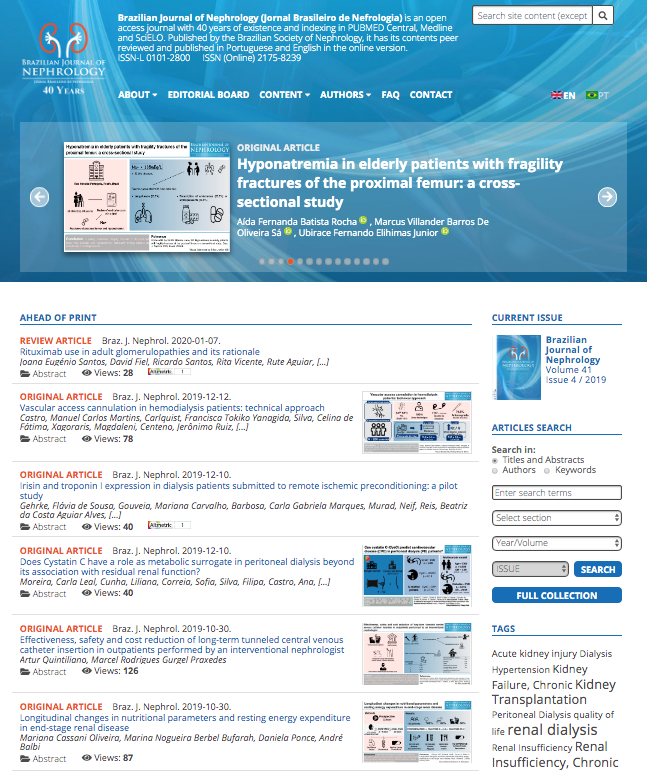By Miguel Carlos Riella and Fabiana Montanari Lapido
Amid the celebrations of its 40 years, the Brazilian Journal of Nephrology (BJN) is preparing to face a major challenge: to consolidate itself as the leading nephrology journal in Latin America.
Created in 1979 by the Brazilian Society of Nephrology (Sociedade Brasileira de Nefrologia , SBN), Brazilian Journal of Nephrology, or Jornal Brasileiro de Nefrologia, is an open access scientific journal indexed by Medline, SciELO, Lilacs, DOAJ, Latindex and, in 2019, started to also be indexed by PubMed Central and Scopus.
Its content is published in two languages – Portuguese and English – and is presented in two formats: print and electronic. In print format, the journal has a circulation of approximately 1,500 copies and is mainly distributed through subscriptions to SBN members. The electronic format, in turn, can be accessed free of charge and from two domains: a domain in the SciELO Brazil Collection (www.scielo.br/jbn), which is updated by the SciELO Program; and its own domain (https://bjnephrology.org/), launched in celebration of its 40th birthday, operated and published by the BJN Team, supported by SBN (Figure 1).

Throughout the journals trajectory, BJN editor-in-chiefs have made a number of efforts that have contributed to its development, such as the indexation by SciELO (2009) and Medline (2010), which not only increased its relevance in the national context, but also made possible its inclusion in the international scenario.
With the international access, came also the need to improve its scientific quality and its editorial processes. Due to that demand, in 2015, actions started to be implemented aiming at its professionalization, internationalization and financial sustainability.
To achieve professionalization the group of Associate Editors has been expanded and members were asked to have active participation in the editorial processes. To keep an agile and efficient Editorial Board, its composition is constantly renewed.
In this process of renewal of the Editorial Board, the ScholarOne system proved to be an important tool for evaluating and supporting the management of the editorial processes, capable of adding transparency to the manuscript review and supporting the Editorial Team’s decision-making.
Still within the scope of its professionalization, the decision to transfer the management of BJN’s editorial production to SciELO made it possible to structure the basis for its internationalization as well as add two important components to its processes:
- The development of an advanced and customized article publishing flow that started with the implementation of the ahead of print publication method.
- Application of a set of technical standards, fundamental in making BJN reach its maximum indexing value. SciELO works in constant harmony with the state of the art in scientific communication, promoting the adoption of standards and good publishing practices and constantly monitoring trends and innovations. Its means that the rules and procedures are constantly updated. The collection of ORCID IDs from the authors and its publication in the final article is an example of the application of rules and procedures to align BJN with other international journals and editorial groups.
In regard to the internationalization of the journal, the adoption of the English version of its title was the first action taken, which was followed by the decision to produce its print version in English, with only titles, abstracts and keywords also added in Portuguese.
Other efforts that contribute to its internationalization include: a) the adoption of ScholarOne, widely used by the interactional scientific community as a manuscript submission and review management system; b) the publication of articles in ahead of print, which allowed their rapid indexation in international indexes; c) the notification of new issues sent to the nephrology institutions of Latin America; d) the greater participation of foreign authors in the issues, by publishing invited articles; e) the expansion of the participation of foreign researchers in the Associate Editors Group; f) the indexation by PubMed Central and Scopus, and; g) the submission of BJN to the indexing process of the Web of Science database.
In parallel to BJN’s internationalization actions, some efforts were also made to bring BJN to social media. A Facebook page was created as well as a Twitter account where posts of press releases and visual abstracts (Fig. 2) of newly published articles are made.

For the development of a continuous flow of content production on the BJN for dissemination on social networks, a new section was created within the Editorial Board, called “Social Media and Visual Abstract”.
The visual summary is a resource that was used by leading scientific journals and is already known in the field of nephrology. It consists of content produced in order to provide a quick reading of the essence of the article. As it is graphic information, it has great adherence to social networks and also a potential for dissemination to be explored.
In addition, strategies were defined in conjunction with SBN’s press office for a more effective dissemination of BJN content on the Society’s social networks.
The BJN is undergoing intense changes, with adoptions of editorial policies and practices aimed at increasing its scientific relevance, improving its editorial processes and its alignment with the latest trends in scientific communication, thus laying the foundations to consolidate its internationalization.
In the following video, Dr. Miguel Carlos Riella (Editor-in-Chief) highlights important aspects of BJN’s trajectory and its relevance to the nephrological scientific community.
Also available in Portuguese are videos featuring Marcelo Mazza (SBN’s President) e Dr. Jocemir Ronaldo Lugon (former Editor-in-Chief).
Reference
MENDONÇA, A. Persistence and normalization of data were the main topics of the III SciELO-ScholarOne Updating Course [online]. SciELO in Perspective, 2017 [viewed 18 February 2020]. Available from: https://blog.scielo.org/en/2017/08/29/persistence-and-normalization-of-data-were-the-main-topics-of-the-iii-scielo-scholarone-updating-course/
NASSI-CALÒ, L. Internationalization as an indicator of journal performance in Brazil: the case of Psychology [online]. SciELO in Perspective, 2017 [viewed 18 February 2020]. Available from: https://blog.scielo.org/en/2017/03/14/internationalization-as-an-indicator-of-journal-performance-in-brazil-the-case-of-psychology/
PADULA, D. Journal Indexing: Core standards and why they matter. LSE Impact of Social Sciences, 2019 [viewed 18 February 2020]. Available from: https://blogs.lse.ac.uk/impactofsocialsciences/2019/08/22/journal-indexing-core-standards-and-why-they-matter/
SciELO – Priority lines of action 2019-2023 [online]. SciELO 20 Years. 2018 [viewed 18 February 2020]. Available from: https://www.scielo20.org/redescielo/wp-content/uploads/sites/2/2018/09/Líneas-prioritaris-de-acción-2019-2023_en.pdf
External links
Brazilian Journal of Nephrology <https://bjnephrology.org/>
Brazilian Journal of Nephrology (SciELO) <http://www.scielo.br/jbn>
Como citar este post [ISO 690/2010]:

















Recent Comments